
News
Summers Will Not Finish Semester of Teaching as Harvard Investigates Epstein Ties

News
Harvard College Students Report Favoring Divestment from Israel in HUA Survey

News
‘He Should Resign’: Harvard Undergrads Take Hard Line Against Summers Over Epstein Scandal

News
Harvard To Launch New Investigation Into Epstein’s Ties to Summers, Other University Affiliates

News
Harvard Students To Vote on Divestment From Israel in Inaugural HUA Election Survey
African Leaders Call for Action on Trade and Accountability at IOP Forum

Two prominent African leaders said the Trump Administration’s tariffs will diminish U.S. influence and weaken diplomatic relations with African countries at an Institute of Politics forum on Friday, just under a week after Trump’s 10 percent tariffs took effect.
George Opare Addo, the Ghanaian minister for youth development and empowerment, said that China is taking the U.S.’s place in trade across the African continent.
“The good news is that other countries will begin to step in, and the ground the U.S. covered in Africa — very soon, they’ll be losing it,” Addo said. “Because today, our biggest trading partners are not the U.S. anymore. It’s China.”
“When the Chinese give you grants or loans, it doesn’t come with the kind of restrictions that usually the U.S. imposes on you,” he added.
Marth Wangari Karua, the former minister of justice and constitutional affairs in Kenya who also spoke at the forum, praised the president of Namibia’s choice to implement reciprocal tariffs and suggested that other African countries do the same.
“She reciprocated on the issue of visas — U.S. citizens will need visas to go to Namibia,” she said. “Africa should reciprocate with a tariff for the U.S. the way I’m seeing Canada doing.”
The forum, which was moderated by Zoe Marks, faculty director of the Center for African Studies at the Harvard Kennedy School, also covered the impacts of the cuts to the U.S. Agency for International Development imposed by the Trump administration. As a result of the funding cuts, Ghana will lose more than $100 million, while Kenya will lose more than $200 million — funding that usually goes toward health initiatives, education, and infrastructure.
Karua called the cuts “a wake up call.”
“Governments are lamenting about the loss of the funding from the U.S.A. But personally, I’m not lamenting,” Karua said. “Since when did our health become a matter of the United States taxpayer? We should reallocate our budgets to the critical needs of our people, and cut wasteful spending.”
In agreement with Karua, Addo said he believes that the cuts to international aid from the U.S. were inevitable.
“It was going to happen somehow, someday, sometime, and it’s happening now,” he said
Both speakers advocated for Africa’s shift toward self-reliance in light of a quickly changing international situation.
“In the story of innovation, when you are challenged, you go back to the drawing board and begin to find solutions,” Addo said.
The speakers proposed focusing on corruption reform, removing trade barriers, and improving prospects for Africa’s youth.
“If we are having corruption and impunity as barriers to economic development, creating a disabling — not enabling — environment, even for local business,” Karua said. “We are then killing the opportunity of integration.”
Both leaders supported the African Continental Free Trade Area — the African Union’s proposal to open up borders for people, goods, services, and potentially impose a single currency across the African region — but warned that implementation remains stalled.
“It will become the biggest economic trade zone in the world,” Addo said.
“But the question remains,” he added. “Why haven’t we been able to achieve that form of integration?”
According to Karua, economic shortcomings across the continent, such as the failure to implement free trade, are especially impacting Africa’s working age population.
“We have made our citizens economic refugees,” Karua said, referring to more than 146,000 Africans who fled to Europe last year amid economic hardship.
Karua and Addo called on citizens to hold governments accountable for impunity and corruption.
“These are, to me, the areas we have to really invest in working on so that the A.U. ceases to be a club of leaders protecting themselves to retain power, and becomes a facilitator of African people,” Karua said.
Want to keep up with breaking news? Subscribe to our email newsletter.
